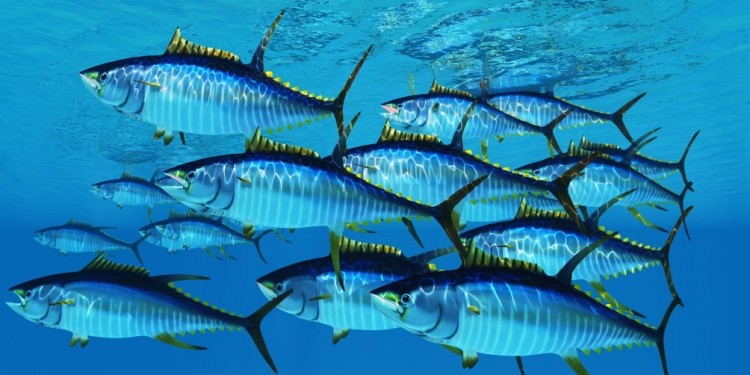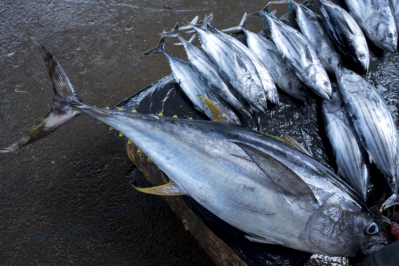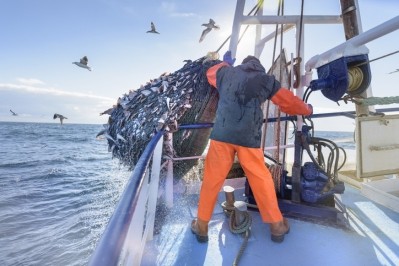Illegal, unreported and unregulated fishing: ‘Companies exploit the weakness of the system’

It is estimated that over 34% of the world’s fisheries are overfished while 60% are fished to their maximum capacity. According to WWF, illegal, unreported and unregulated (IUU) fishing is a 'leading cause' of overfishing internationally. IUU fishing puts wild fish stocks and ocean habitats at risk, threatening species extinction and disrupting marine food webs. It distorts competition, inflicts damage on costal communities and is associated with other crimes, like money laundering and human trafficking.
It is also an issue that is on the rise, non-profit Planet Tracker says, as companies seek out ways to maintain profit margins amidst declining wild fish populations.
Estimates place the annual global IUU catch at anywhere between 11 and 26 million tonnes of fish, representing up to 20% of the world’s total catch. The UN Food and Agriculture Organization says illegal fishing is an industry worth around US$23bn a year and the organization describes it as ‘one of the greatest threats to marine ecosystems’.
The drivers behind IUU are largely economic. But while illegal fishing might bring to mind images of pirate fishermen, a new report from Plant Tracker reveals that publicly listed companies are also undertaking illegal fishing practices.
“There is a general expectation that listed companies are unable to undertake illegal activities while listed on a recognised stock exchange. This is false: listed companies may knowingly or unknowingly be involved in illegal activities,” the report warned.
Planet Tracker named and shamed three listed companies that own vessels ‘presumed to be engaged’ in, or who 'have engaged' in, IUU fishing: Dongwon Industries Co Ltd, listed in Seoul; Rongcheng Xinlong Aquatic Products Co Ltd, listed in Shenzhen; and CNFC Overseas Fisheries Company Ltd, listed in Shenzhen. “In addition, Pingtan Marine Enterprise, listed in New York, was accused of IUU fishing by the US Department of State, but none of their vessels appear on IUU lists, thereby putting investors in a particularly precarious position,” FoodNavigator was told.
François Mosnier, a Financial Research Analyst at Planet Tracker and author of the report, believes that IUU fishing represents a material risk to investors. The case of Pingtan Marine Enterprise clearly demonstrates the financial hazard that IUU fishing represents. Since the company was publicly accused of fraudulent activities including IUU fishing its stock has lagged the S&P 500 by 93%.
“IUU fishing is an example of poor governance with detrimental environmental impact. It is a key ESG risk for wild-catch companies. Whilst stock exchanges provide guidelines for disclosure of non-financial metrics alongside disclosure of financial risk, only a minority of exchanges where listed entities are engaged in wild-catch fishing require ESG reporting as part of listing rules,” Mosnier explained.
Europe’s exposure to IUU fishing
It isn’t just investors that are at risk of unintended exposure to IUU fishing. The European Union is the largest seafood market in the world, importing more than 60% of its seafood, and IUU practices remain a persistent challenge for enforcement agencies in the bloc.
Two of the fisheries linked to IUU practices by Planet Tracker have market access in the European Union, FoodNavigator understands. CNFC Overseas Fisheries Company is included on the EU’s list of registered suppliers authorized to sell fishery products in the bloc, featuring on the list of approved Chinese suppliers. Meanwhile, Korea’s Dongwon Industries – which describes itself as the ‘world’s number one seafood company’ – says it exports tuna products to markets including Europe, the US and Japan.
“The EU has a relatively robust anti-IUU legislation precisely to avoid importing IUU-caught fish. However, it cannot be excluded that some fish caught illegally enters EU markets,” Mosnier told us.
The research analyst suggested that the import / export system still contains a number of loopholes that can be exploited by companies engaged in IUU practices. “For instance fish imports are still accompanied by paper-based catch certificates (about 50,000 a year for just one country like Spain), and there is no fully digital EU-wide system yet to share information between Member States. It is widely suspected that companies engaged in IUU exploit the weakness of the system by importing fish via Member States with less strong implementation of the anti-IUU regulation.”
While IUU fish from outside Europe ‘can enter EU supply chains’, Mosnier also stressed that Europe cannot be absolved of direct involvement in IUU fishing activities. “Let’s not forget that IUU fish in European supply chains also comes from the EU directly. There are multiple cases of IUU fishing in Europe, especially linked to Spain, Malta, Italy, or France.”
Indeed, earlier this year more than 11 tonnes of fish, molluscs and crustaceans were seized in a Joint Action Day led by the Portuguese Guarda Nacional Republicana and supported by Europol.
Planet Tracker believes the solution to this problem is more robust systems of traceability and transparency. “Planet Tracker is engaging with investors and corporates to ensure that seafood supply chains implement traceability systems (and reap the financial benefits of doing so),” Mosnier said.
The non-profit think tank estimates that implementing seafood traceability could double the profit margin of fish processors while reducing investors’ risks. It stressed that there is a limit to which stock exchanges can protect investors and, as such, urged them to practice due diligence in their investment decisions.
To empower investors to assess their exposure to IUU fishing, Planet Tracker has designed a toolkit that scores listed entities based on the number of potential IUU fishing red flags they accrue.

















